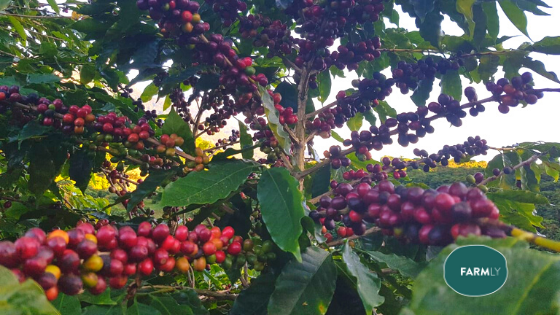Today we will be telling you Matheu’s story, a boy in the region of Manhuaçu/MG with some interesting ideas to share. The FARMly team interviewd him a few days ago and this is how it went.
Don’t forget to follow his account on instagram and support our local producers.
1 – What is your family’s history ?
This history was told by my father; Geovane José Estanislau (Professor, biologist, homeopath and farmer):
“The property was acquired by my father-in-law in 1975, adding another asset to the Filgueiras and Gomes family. The name Sítio São Francisco is related to the name of the stream where it is located, which is also São Francisco.
I moved here in 1998, with the aim of taking care of all its plantations and their functioning. The treatment of their crops was conventional, that is, chemical fertilizers and pesticides. In 2005 I was diagnosed with ischemia (lack of blood) in the macula of the left eye, I went blind and the doctors told me that if I saw again it would be around 30%.
I started a Homeopathic treatment and after three months, I returned to the ophthalmologist who was accompanying me. He did the exams and asked me what I had done, as my vision had already returned 50%. “Keep taking care of it like that,” the doctor told me. That’s what I did, and after six months of treatment, I returned for another exam and to my surprise and the doctor’s, my vision was 100% recovered. From then on I started to question whether homeopathy is good for animals it should also be good for plants. I started to do some tests, and I realized that the results were good.
I started researching how homeopathy worked and decided to deepen my knowledge looking for courses to improve my personal development, which soon gave me greater security so that I could eliminate all the crop protection products that, until then, I had to use on this site. Of course, a change in philosophy of life is sometimes not easy, because we have to deal with a whole social and family culture, and what I found with this change was a lot of criticism, disbelief and irony, because in 2005 nobody in my region was talking about organic coffee.
I did not let myself down, because my focus was to get a sustainable plantation and a place that would produce healthy food for my family, my children were growing up. I trusted God and thought, he will not let my production have problems, because I am only taking care of a little piece of this planet, I believe in the way that he would like us to take care, or be as natural as possible.
In 2012, I managed to eliminate the chemical fertilizer and from there, just prepare to achieve my goal, which was to achieve certification as an organic producer, a fact that happened in 2018, thanks to our good God.”
2 – How did you get into the cafe? Staff and production size?
My name is Matheus Gomes Estanislau, I was born into a family of coffee producers in which, since I was very young, I helped in the production of beans in some way, always “stuck” in my grandfather to learn from him about this culture.
I worked for them until I was 18, and from then on I started helping my father in the administration and production of Sitio São Francisco, in which we started to change the entire structure and methodology of production. We planted native trees in the middle of the coffee plantations, built suspended terraces and started to wash and select all our production (80 bags / media), many other things were gradually changed; we broke all the paradigms and did everything so that in the end we had the best coffee possible, and everything done only in family, from grain to cup, me, my father, my mother and my sister, and always accompanied with demotivating words, criticisms and laughs about us. Today, I am 21 years old, 2 years after the certification of our crops and 8 years after adopting the organic culture without thinking of going back, I am very proud to say that I am a producer of specialty organic coffees, and we will finally commercialize our product, with our brand.
3 – What is the objective nowadays with coffee production?
Sell 100% of our production, as organic coffee. Because nowadays it is still very difficult for small producers to find buyers for all their production, we find many barriers since production and even more for commercialization, consequently many cease to persist in the organic and return to traditional cultures. Today I seek to improve our structures, facilitate our workforce and produce coffee with better quality.
See more of Matheus on our instagram. Let us know on the comments.




Like!! I blog quite often and I genuinely thank you for your information. The article has truly peaked my interest.